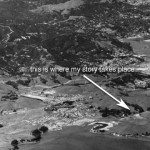
Marin in working class days
Let me explain how much I love Tiburon hills where I grew up after my family left San Francisco. They were my hills, and they were safe.
Coastal Miwoks lived thousands of years before California had a name, before Marin County, before my neighborhood called Bel Aire exploded into a subdivision. They dug clams in mucky salt marsh and didn’t leave a written language. We felt their presence in every blade of grass and crevice of hillside.
After the Spanish moved in, smallpox almost completely destroyed Miwok communities, forcing them north to Mission San Rafael, away from their hills.
Immigrant Portuguese farmers from the Azores arrived, and built Marin dairies. ‘Reed Station,’ was an old Portuguese dairy farm stop for Southern Pacific railroad headed south toward Tiburon. Remains of a large, run-down barn and other dairy buildings stood up behind my house, and we played in them.
A Marin rancher sold marshland to a developer named Blackfield in the early 1950’s, and he built our neighborhood on Richardson Bay.
Our house was in a new subdivision on a cul-de-sac, with a dirt path behind it, which had once been an ancient Miwok trail. Blackfield planted sycamores in front of every house.
Estates was a joke, since four or five “ranch-style homes” filled an acre. Original houses had 900 square feet total living space, a ‘one car’ garage, four full-length plate glass windows facing a private patio and large backyard. Lawns hadn’t started, so we watered prickly burr clover and thick green tufts of weed and planted bushes too close to the front bedroom windows. We grew up smelling sweet timber and chewing black tar picked off the side of construction trucks.
Bel Aire kids ran up and down the streets, and five kids lived next door to us. We’d form combinations,
“Just you, not her. Let’s go over to my house.” We gave our dolls baths in backyard galvanized laundry tubs, rode bikes with training wheels around newly paved streets and sidewalks, colored cellophane tails flapping from our handlebars. I felt grown-up galloping around my friends’ yards and inside their houses, with everyone’s mother keeping an eye on us.
My parents both commuted to work in San Francisco, so they hired Dorothea to babysit, a nice lady from nearby Marin City. Though my skin color was not the same as hers, everything else was. I don’t know what happened to Dorothea, who had seemed fine to me. Grandma Brown moved from Baltimore to care for us. She was in her late seventies by then and was probably broke.
The Colonial Bakery man made rounds in his tan and blue wagon, opening back double doors with bleachers of pastries. “One a penny, two a penny, hot cross buns,” My grandma sang to us and bought buns decorated with white sugar crosses.
The milkman delivered glass quart bottles with cute paper tabs on top. He brought up full quart bottles in metal racks to our little milk box and picked up the empties. I lifted the milk box lid and and drank from the bottle before it got inside the house. My grandma caught me, but I ran away because she couldn’t chase me down.
Leave a Reply